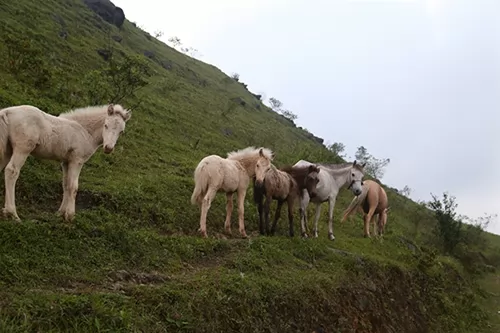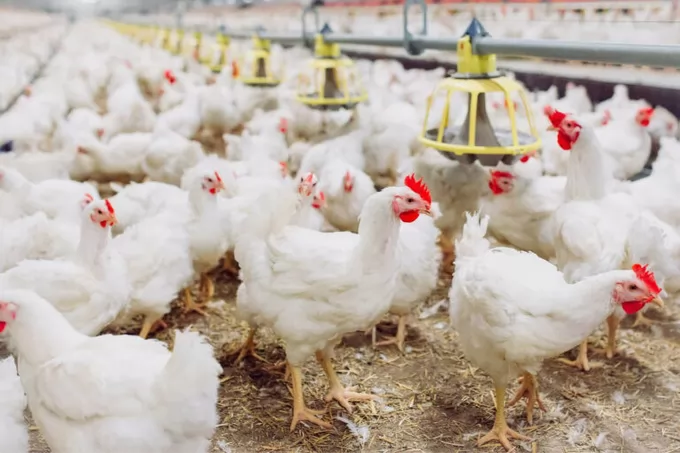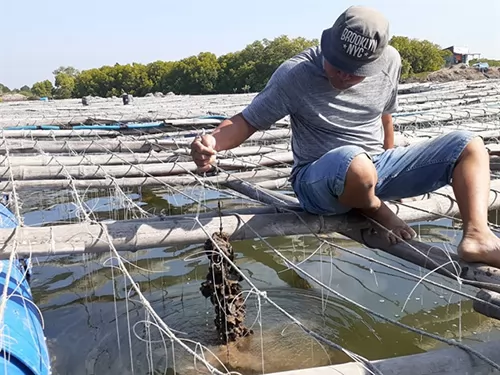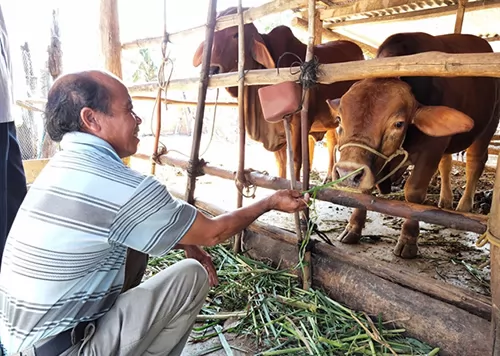In the kingdom of Hữu Kiên white horses

Horses are very popular in Khau Sao Meadow with a population of nearly 2,000. — VNS Photos Hồng Minh
Hồng Minh
HÀ NỘI — When talking about travel to the northern province of Lạng Sơn, you may think of the historic Chi Lăng Passage which used to be the barrier protecting Việt Nam from Chinese invaders or the famous Nhất Thanh-Nhị Thanh-Tam Thanh caves.
But in recent years, a new attraction in Chi Lăng District has sprung up, namely Khau Sao Meadow with its vast grass fields and thousands of horses.
The beauty spot has become known as the kingdom of white horses as it's home to nearly 800 of the stunning creatures.
It sounds to me a perfect escape from the city whenever stress from life and work gets me down. It's a place without car honking or skyscrapers blocking my view, where I can climb hills, enjoy relaxing fresh air, green grass and trees and befriend animals.

The road to the Khau Sao Meadow is difficult with high slopes.
From Hà Nội, it took me a 2.5-hour drive to get the meadow, with two-thirds of the time on the Hà Nội-Bắc Giang and Bắc Giang-Lạng Sơn highways. After getting off the highway at Đồng Mỏ Town, the road from National Highway 1A to the meadow is a challenge as the small concrete path passes along the mountains through villages, rice fields and forests to Hữu Kiên Commune where the meadow is located. That 20 km road to the meadow at an altitude of nearly 800 metres is not easy with some slopes up to a 15-17 per cent gradient incline.

A white horse and her baby graze at Khau Sao Meadow.
But once I got past the difficult highland road, the green prairies stretched as far as my eyes could see. Relaxation, population me.
Setting foot on Khau Sao Meadow, I could feel the cool, fresh, unspoiled nature right away. I have been to many hills, valleys and meadows across the country, but Khau Sao Meadow brought a different feeling, more peaceful and strangely beautiful. Probably because there were not many people around.

Khau Sao Meadow is mainly grassland, so it becomes an ideal place for cattle such as horses, buffaloes, goats and cows to graze.
Khau Sao Meadow covers more than 144 hectares among hills and mountain ranges from 800-1,000 metres above sea level. The area is mainly grassland, so it's an ideal place for animals such as horses, buffaloes, goats and cows to graze.
Locals allow their horses to freely graze and there are said to be about 2,000 in the meadow, including 800 white horses, a rare native breed of Hữu Kiên Commune. Purebred horses in Hữu Kiên Commune have small bodies, weighing from 70 to 100 kilos. They are raised to sell for meat or bone glue.
In the morning, local people take their horses to the meadow and let them roam free. The horses are individually marked with a bell around their neck corresponding to the household that owns them.

Nông Thị Sao feeds a white horse with maize.
I spoke to local woman Nông Thị Sao who was grazing a mother white horse and her 15-day-old foal.
She said the white horses are sold for a higher price than other horses, with an adult fetching VNĐ50 million-70 million (US$2,200-3,100).
“Selling two white horses could help us rebuild our house while selling four could help us buy a car,” she said.

Visitors can befriend with the animals in the meadow.
Of course, besides the fresh air, green grass and animals, there are people you can meet here. The people in the meadow are mostly Tày and Nùng ethnic people, who are very kind and gentle. They will talk about their cattle and horses and how to take care of them. If you are lucky enough, you will be invited to have dinner with them as you take a magical break in the meadow. — VNS
Maybe you are interested

Black soldier fly larvae research boost for UK poultry sector
Funding totalling £3 million has been granted to a UK consortium which will utilise advanced technologies and black soldier fly larvae to improve poultry welfare and promote sustainability in the industry.

Bà Rịa - Vũng Tàu farmers expand breeding of Pacific oysters
BÀ RỊA-VŨNG TÀU — More farmers in the southern province of Bà Rịa-Vũng Tàu are earning more income by breeding Pacific oysters in an environmentally friendly and sustainable way.

Gia Lai seeks to improve quality of beef cattle through cross-breeding
GIA LAI — Gia Lai Province, which has the largest beef cattle herd in the Tây Nguyên (Central Highlands) region, has undertaken many programmes to develop the quality of its animals by crossing native cows and hybrid bulls.





